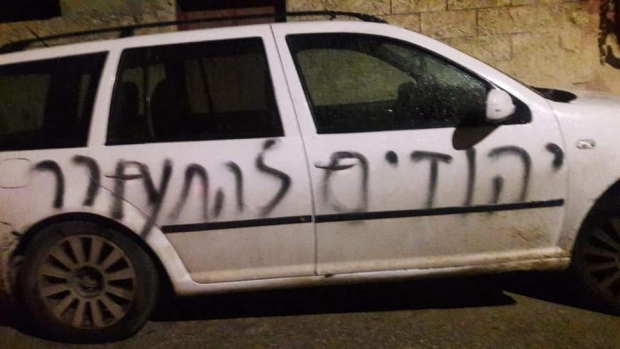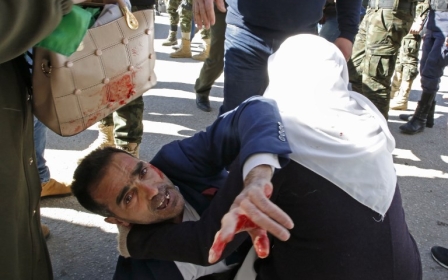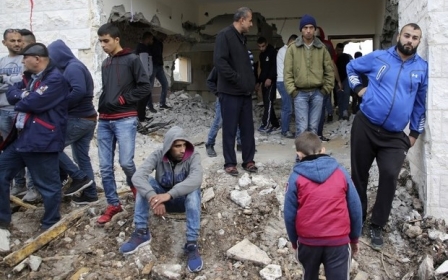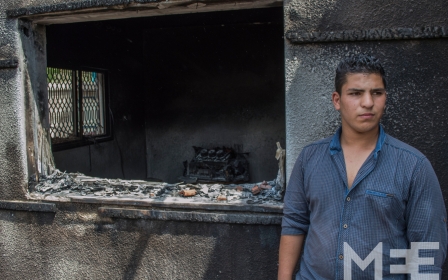Palestinians living in fear amid spike in Israeli settler 'price tag' attacks
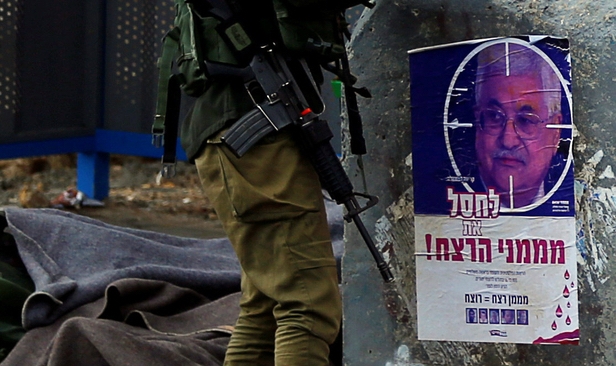
YASUF, Occupied West Bank - Palestinians in the village of Yasuf woke up on Tuesday morning to find their car tyres slashed and homes covered in racist, Hebrew-language graffiti, in what residents told Middle East Eye they believe was an attack by Israeli settlers.
Nashaat Abed al-Fattah, Yasuf's 37-year-old mayor, told MEE that a group of Israeli settlers raided the village before dawn on Tuesday.
"They slashed the tyres of 24 vehicles and sprayed graffiti on many homes, including mine, as well as the village mosque,” he said.
"Price tag", "Revenge" and "Death to Arabs" were among some of the messages spray-painted on homes throughout the village, Abed al-Fattah said.
They have burned cars, tried to set our mosque on fire, and attacked homes with rocks before
- Nashaat Abed al-Fattah, Yasuf mayor
It’s not the first time settlers have attacked Yasuf, he added, which is located just a few hundred metres from the illegal Israeli settlement of Tappuah.
“They have burned cars, tried to set our mosque on fire and attacked homes with rocks before,” Abed al-Fattah said.
"But this attack is one of many that have happened over the past week. They are trying to intimidate us and scare us because of the shooting attacks," he said, referring to a string of violent incidents that occurred in the West Bank last week.
Increase in 'price tag' attacks
Two Israeli soldiers were killed in two shooting attacks outside a settlement outpost near Ramallah last week, prompting Israeli settlers to increase their use of so-called price tag attacks.
These attacks are often carried out against Palestinians and their property in retaliation for perceived slights against Israel's settler movement, or political developments the settlers oppose.
Local media and activists have reported several incidents on roads in the Ramallah and Nablus areas, where settlers have ambushed Palestinian drivers, hurling rocks at their vehicles and causing damage and injuring drivers and passengers.
Hebrew posters have also appeared in the Nablus-area town of Huwwara, which is surrounded by several settlements, calling for the death of Palestinian President Mahmoud Abbas, who is labelled as a "supporter of terrorists".
‘They tried to kill me’
Indeed, the price-tag attacks have not been isolated to Yasuf alone.
Issa Hamdan was sitting at home in the Nablus-area village of Asira al-Qibliya on 13 December when he heard shouting coming from his aunt’s house next door.
“I rushed out to see what was happening, and I found more than 10 settlers, under the protection of a group of soldiers, attacking the neighbourhood homes with rocks,” the 26-year-old told MEE.
“When I got closer to my aunt’s house, the soldier’s shot me in the head with a rubber bullet.”
It was clear from the way they were hitting me what their intentions were: they were trying to kill me
- Issa Hamdan, Asira al-Qibliya resident
When he fell to the ground, the group of settlers attacked Hamdan and began assaulting him, he recalled.
“They started beating and kicking me, cursing me, and throwing rocks at me from very close range,” he said. “After a few moments, I lost consciousness.”
When Hamdan woke up, he was in a hospital bed, covered in blood and in excruciating pain.
“The neighbours had managed to grab me and rescue me from the settlers,” he said. “They told me that when they reached me, the settlers were about to smash a huge rock on my head.”
Hamdan said doctors told him he suffered several skull fractures and bruised ribs, and he also had to get five stitches to close a gash on his forehead. “If my neighbours hadn’t arrived in time, I would have been dead,” he said.
“It was clear from the way they were hitting me what their intentions were: they were trying to kill me.”
A common occurrence
Asira al-Qibliya is one of six Palestinian villages located in the valley below the notoriously violent Yitzhar settlement, the site of many of this week’s attacks on Palestinians.
Residents of the villages are subjected to nearly-constant attacks from the settlers, who ambush homes, assault shepherds, chop down olive trees, and burn farmland, human rights groups have regularly reported.
Translation: The moment a group of settlers attacked the car of Qassam Nazzal on his way from Ramallah to Jenin today
"The homes at the top of the village, where I live, are only a few hundred metres from the edge of the settlement,” Hamdan said, “so we often bear the brunt of the attacks.”
“Since I was a boy I have been witnessing the settlers attack us,” he said.
While he said settlers carry out attacks at least once a month in the village, residents "always see an increase in settler violence" when an attack is carried out against Israeli settlers in the West Bank, such as the shootings last week.
“They call them price-tag attacks, but to us, they are just part of the everyday violence we face from settlers,” Hamdan told MEE.
What happened to the Dawabsheh family is evidence of what the settlers are capable of
- Nashaat Abed al-Fattah, Yasuf mayor
Despite the frequency of such violence against Palestinians, this week’s settler attacks have left many people fearful that things could escalate even further.
“What happened to the Dawabsheh family is evidence of what the settlers are capable of and many of us are aware of this fact,” Abed al-Fattah, the mayor of Yasuf, told MEE, referring to a 2015 attack in which Israeli settlers set fire to a Palestinian family's home in the West Bank village of Duma.
Saad and Riham Dawabsheh and their 18-month-old baby, Ali, were killed in that attack, while the couple's four-year-old son, Ahmed, was the sole survivor.
“Many people are scared to drive in their cars because of what’s happening,” Abed al-Fattah said, pointing to the case of Aisha al-Rabi, a Palestinian mother of eight who was killed in October when Israeli settlers hurled rocks at her car on the main road near Nablus.
“These settlers are terrorists that are protected by the terrorist state of Israel,” he said. “As long as the settlers are here on our land, there will never be peace.”
Middle East Eye propose une couverture et une analyse indépendantes et incomparables du Moyen-Orient, de l’Afrique du Nord et d’autres régions du monde. Pour en savoir plus sur la reprise de ce contenu et les frais qui s’appliquent, veuillez remplir ce formulaire [en anglais]. Pour en savoir plus sur MEE, cliquez ici [en anglais].


